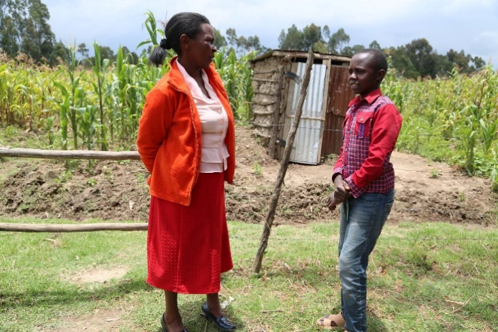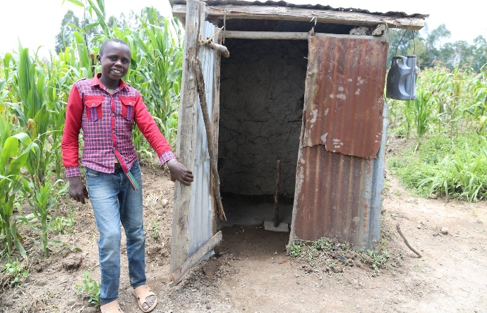On 14th September 2017, AMREF Kenya and Center for Behavior Change Communication (CBCC) carried out a learning and documentation training as part of the implementation of K-SHIP, a WASH Project implemented by the two organizations and funded by the Water Supply and Sanitation Collaborative Council (WSSCC) through the Global Sanitation Fund (GSF). This project aims to to contribute towards the broader goals of poverty eradication, health and environmental improvement, gender equality and long-term social and economic development. CBCC implements the social and behavior change communication (SBCC) component of the programme by implementing evidence informed behavior change strategies to improve knowledge, attitudes and practices around sanitation and hygiene.
During the training, participants were amazed at the extent to which sanitation and hygiene matters can go. During the practical session, the team visited Ester Njeri’s home, where they met the youthful self-made artisan who built a toilet by himself, making his family and the whole village proud.
Asked about what motivated him, he says, “Every time she visited our home, it was to remind us to construct a latrine, I always felt embarrassed on behalf of my family”, Recalls Moses Mugo with a broad smile. Joyce Wangare, a natural leader and member of Werogamia Village sanitation committee (VSC) in Biashara ward, Naivasha Sub County in Nakuru County is the person Mugo is referring to.

The 16-year-old is the first born in a family of two children, his younger sister is 13 years old. Mugo says they initially had a latrine but it got filled up and was demolished. It was, therefore, necessary for the family to construct another latrine although it had taken too long. “I was forced by circumstances to build one to avoid the frequent visits and reminders by Mama Wangare” Mugo states.
So determined was Mugo that he put in a lot of effort to construct the 13 feet pit latrine in one week. He goes further to explain how difficult it was as he got really tired at the end of each day but the progress he made each day kept him focused on the final goal-a latrine. Some materials like branches were readily available since he used those from the trees in his compound. He took nails and iron sheets from the filled-up latrine, while a neighbour contributed one iron sheet and a jerry can which he used to make the tippy tap for washing hands after visiting the latrine.
For this noble act, Mugo has become an inspiration to both the young and old in his village who have been encouraged to follow in his footsteps and strive to make their village open-defecation free, which is one of the project’s objectives.



